When students were sent home to quarantine in spring 2020, Abby Merk (’22) spent time with her family in suburban Chicago doing what they always did — playing cards and board games together. But this time around, she was struck by the potential in poker. She remembers thinking: “Wait a minute, I can do this one for money … so I better be good at it.”
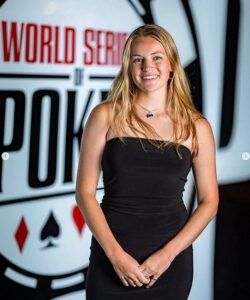
Abby Merk (’22) at the World Series of Poker in Las Vegas; at top, her best poker face. Photos courtesy of Merk
Her studying has paid off. Her biggest tournament win so far was $11,613 in a single day. Merk started playing in the World Series of Poker (WSOP) in Las Vegas, a prestigious series of events, at age 21, the youngest age legally allowed. The main event is an eight-day tournament with thousands of players that costs $10,000 to enter and has a $10 million first-place prize. Merk landed a seat in it this year by winning a tournament with a $200 entry fee. (Unfortunately, she ran up against a stronger hand early on and “busted” in the main event, but she vows to return.)
Merk has supported herself for more than a year from poker winnings; she’s testing the waters as a content creator as well. Merk has produced long-form videos and shorts that she posts on YouTube and Instagram, where her following since January has quickly climbed from 3,000 to more than 70,000 followers.
Her latest long-form video on YouTube, at eight minutes: “How To Win When You’re The Worst Player.” (Her content is full of swagger, Gen Z lingo and poker terms, but it’s also grammatically correct.)
Merk acknowledges the glamorous life she leads at age 24, even making fun of it in a recent reel: “How I sound complaining to my 9-5 friends as a poker player.”
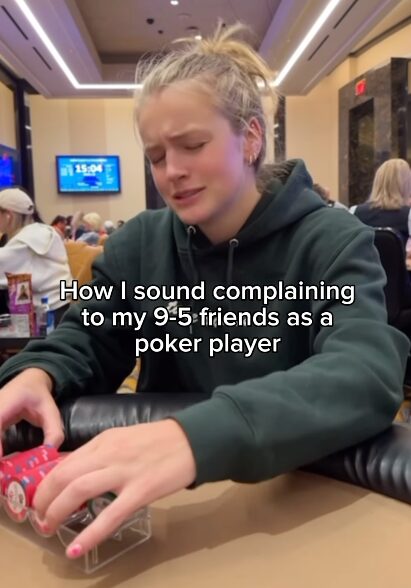
From Merk's Instagram feed
The pandemic spark that started with family game nights was fanned by “Poker Power,” a company created to teach women business skills through learning and playing poker. When its in-person classes were forced to go virtual, Merk quickly learned enough to get hired as a teacher.
“She really learned the ins and outs of it quickly and was good at it,” says AJ Rudolph, who worked at Poker Power as its director of product, education & technology until this year. They went on to play in a “World Series” tournament together in Cherokee, North Carolina, after Merk returned to Wake Forest.
Merk also started teaching poker to her friends on campus, including Madeline Fay (’22), now a project manager in the dean’s office at Wake Forest School of Medicine. “She was so passionate about it from the get-go,” Fay says. “I remember there were days when I would be hanging out with (Abby), and she would have three poker games — one on her computer, one on another screen, one on her phone, and she would just be zipping between all of them and somehow winning two or three at all times. It was so funny.”
Merk and her friends started holding weekly tournaments in Magnolia dorm, where they would each put in about $10. “It wasn’t too crazy — it was chicken nugget money,” Fay says. “But she ended up taking everyone’s money, of course. … It dissolved once everyone realized that Abby was just raking it in.”
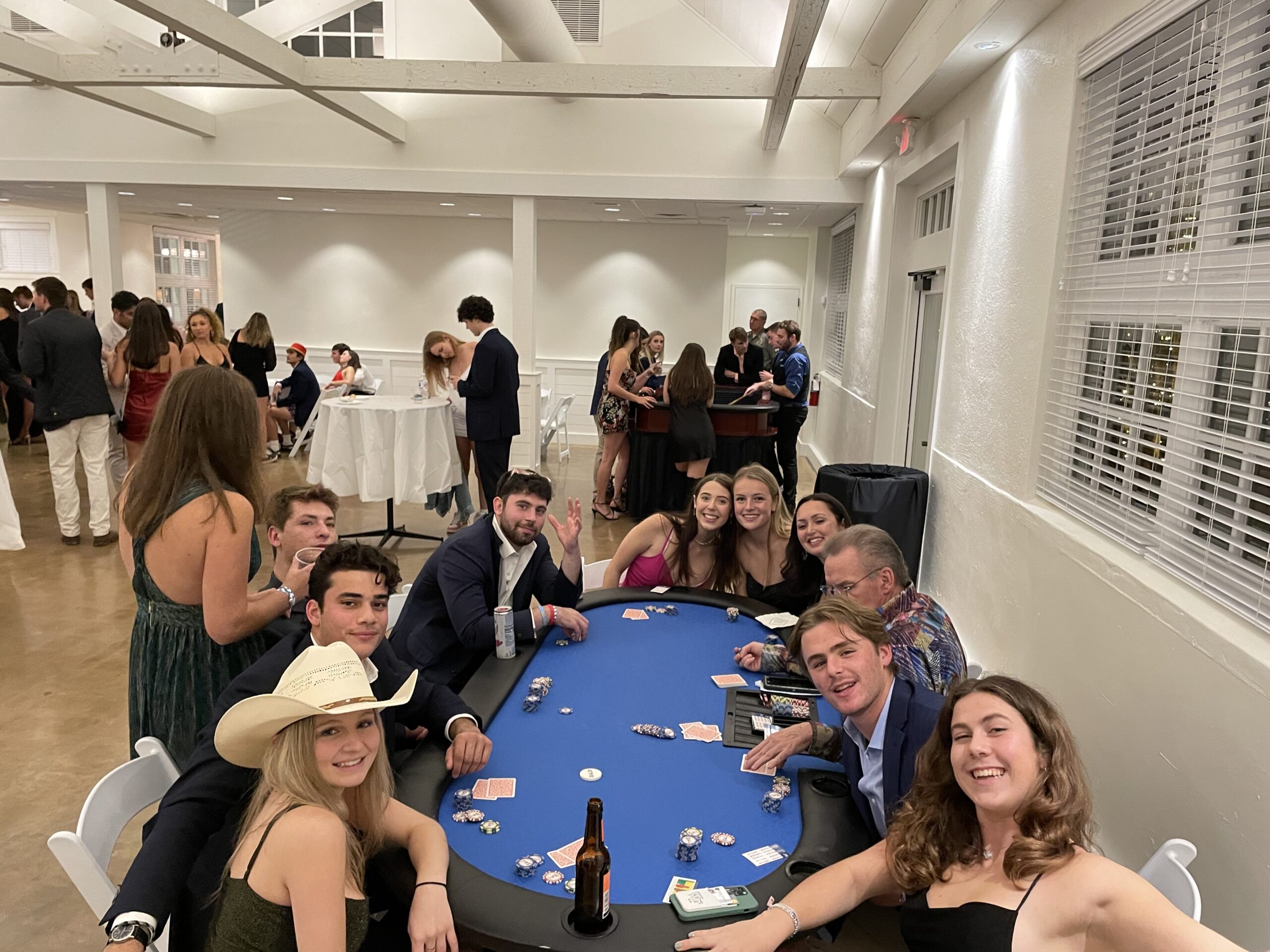
Merk (at the back of the blue table in the middle) playing poker at Wake Forest
When Merk decided to venture into higher-stakes games in Chicago, playing mainly “old, rich, white men,” she was shaken by the sexism at the table that she experienced for the first time. Rarely seeing other young women at the table, Merk built her stamina and resilience the same way as any hard worker: She just kept showing up.
“I got so comfortable with putting myself in uncomfortable situations that truly it does not bother me anymore,” she says. “I told myself, ‘I am going to be wrong. There is no poker player that is not going to make mistakes. I know my worth, and I’m able to sit down at the table and feel confident about that.’”
And occasionally, Merk has used the power of her social media platform, which typically has a more lighthearted tone, “to call out when she’s been treated poorly as a woman,” Rudolph says. “I’m glad she did that.”
“I don’t think there are many other opportunities in my life where I can be such a risk-taker."
Merk did not initially plan to play poker for a living. She had interned at an options-trading firm in Chicago and went to work there full time upon graduation. She says she liked the work and was paid well, but every chance she had, “I was going to the tables. That was my escape.” Merk wound up quitting that job and started applying for more flexible positions that would allow more time for poker. Eventually, she landed a product management role in finance.
Heading into this year, she made a New Year’s resolution to post about poker daily on Instagram. Her following expanded at a steady clip, and big brands in the poker world started asking her to make content including them at the World Series events in Las Vegas this summer. Merk decided to quit her job and “bet on myself” to see how far she can go as a poker player. “I don’t think there are many other opportunities in my life where I can be such a risk-taker,” she says.
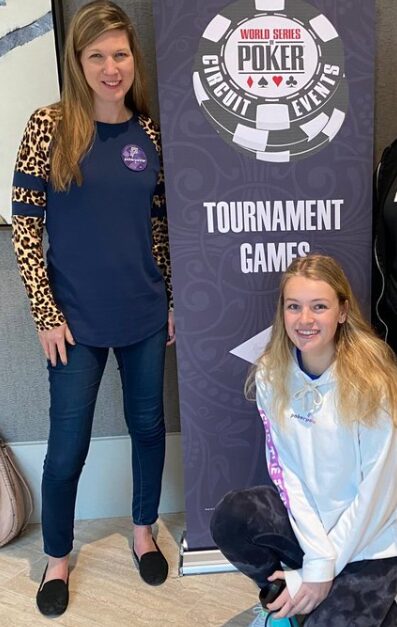
AJ Rudolph with Merk at a "World Series" event in Cherokee, North Carolina
Now that Merk is becoming better known in the poker world, she can no longer count on her competitors’ assuming she’s an easy target. Instead, she’s relying even more on what she learned at Wake Forest, she says. Merk majored in philosophy, which helps “because if you can figure out people’s ideas about you, what they hold to be true, … you can truly figure out what is going into their decision-making.”
She minored in math and credits much of her success to what she learned in the probability class she enrolled in to become a better poker player. Professor Kenneth Berenhaut, of the Department of Statistical Sciences, “was my absolute favorite teacher at Wake Forest,” she says. “I had to go in after class every single day, because I knew that I really wanted to get good at probability. … If you don’t know your odds, and you don’t know your statistics, you’re going to be a losing player.”
The professor remembers her as “a great student to have in class, an amazingly positive energy and just the kind of glue that holds the class together.” He says that Merk did indeed work many extra problems, but she didn’t need to — “she just wanted to do more.”
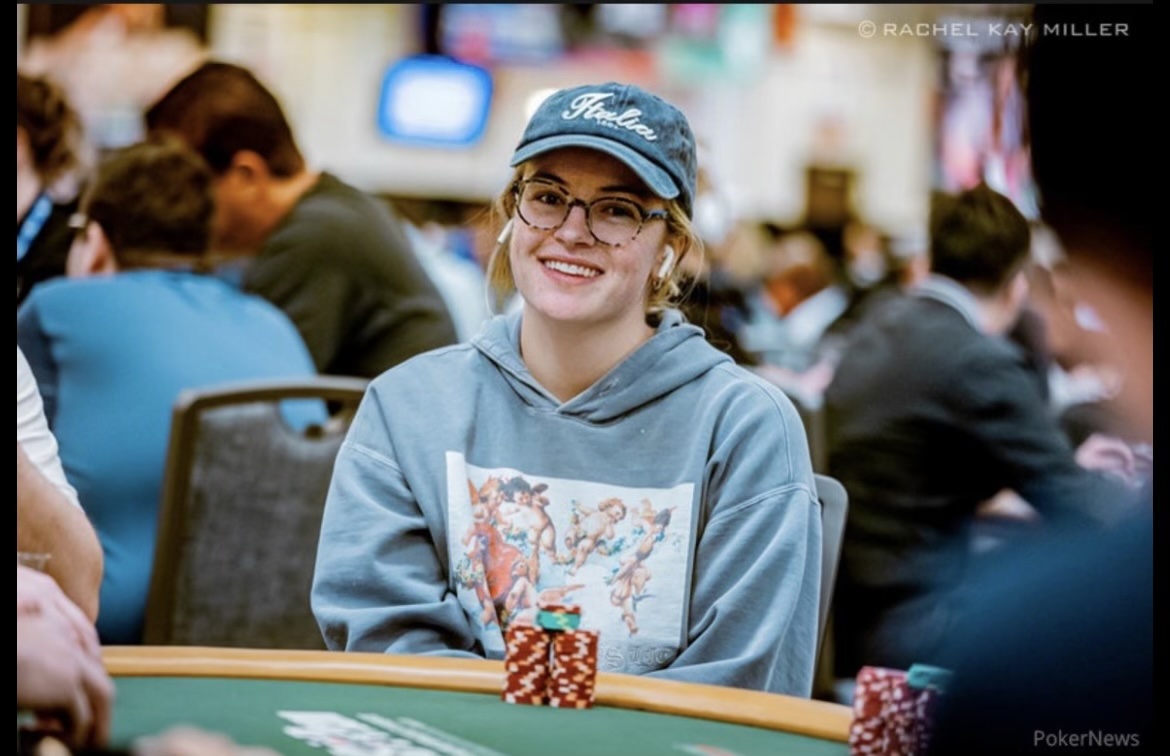
Merk says she typically wears sweats, not dresses, for tournaments that can stretch long into the night.
Berenhaut plays poker as well and has followed Merk’s career. He ventured to Vegas in June and discovered that Merk is well-known “at the highest levels,” he says. “And then I played in some smaller tournaments, and people there knew her as well,” through her online presence. “She’s just a charismatic, resilient, talented person. … She’s an up-and-comer in the poker world.”
The former student and professor met up for a chat, during which she congratulated him for finishing 16th out of 244 players in a tournament. “She was so happy for me,” he says. “I think whatever path she winds up choosing, she has so many skills.”


